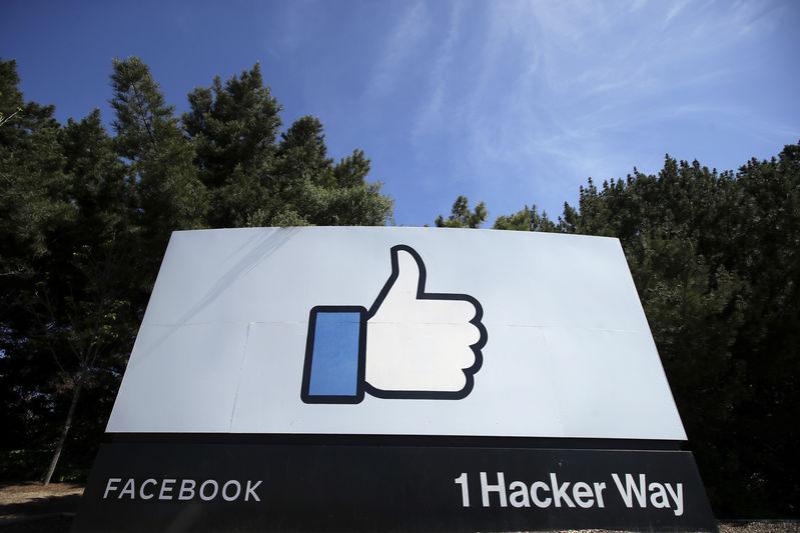
In this April 14, 2020, file photo, the thumbs up Like logo is shown on a sign at Facebook headquarters in Menlo Park, Calif.
18:42 JST, March 26, 2022
BRUSSELS (AP) — The European Union set the stage for a stepped-up crackdown on big tech companies with an agreement on landmark digital rules to rein in online “gatekeepers” such as Google and Facebook parent Meta.
EU officials agreed late Thursday on wording for the bloc’s Digital Markets Act, part of a long-awaited overhaul of its digital rulebook. The act, which still needs other approvals, seeks to prevent tech giants from dominating digital markets, with the threat of whopping fines or even the possibility of a company breakup.
For instance, they face tighter restrictions on using people’s data for targeted online ads — a primary source of revenue for Google and Facebook — while different messaging services or social media platforms would be required to work together.
The new rules underscore how Europe has become a global pacesetter in efforts to curb the power of tech companies through an onslaught of antitrust investigations, stringent regulations on data privacy and proposed rules for areas like artificial intelligence.
“What we have been deciding about yesterday will start a new era in tech regulation,” the European Union’s lead lawmaker Andreas Schwab, said at a press conference Friday.
The same day, however, the European Union reached a preliminary agreement with the U.S. that paves the way for Europeans’ personal data to be stored in the U.S.
In its crackdown on tech giants, the EU also has another set of rules, the Digital Services Act, that aim to ensure online safety for users through stricter requirements to flag and remove harmful or illegal content or services like hate speech and counterfeit goods. Both are expected to take effect by October, EU competition chief Margrethe Vestager said.
The European Consumer Organisation, or BEUC, welcomed the agreement on the Digital Markets Act, saying it would help consumers by creating fairer and more competitive digital markets. Digital rights group EDRi said it will “narrow the power imbalance between people and online platforms.”
Tech companies were less enthusiastic.
Apple said it was concerned that parts of the Digital Markets Act “will create unnecessary privacy and security vulnerabilities for our users while others will prohibit us from charging for intellectual property in which we invest a great deal.”
Google said it will study the text and work with regulators to implement it.
“While we support many of the DMA’s ambitions around consumer choice and interoperability, we remain concerned that some of the rules could reduce innovation and the choice available to Europeans,” the company said.
Amazon said it is reviewing what the rules mean for its customers. Meta, which also owns Instagram and WhatsApp, didn’t reply to a request for comment.
The Digital Markets Act includes a number of eye-catching, groundbreaking measures that could shake up the way big tech companies operate.
They wouldn’t be allowed to rank their own products or services higher than those of others in search results. That means Amazon, for example, wouldn’t be allowed to list its own brand of goods ahead of rival offerings from independent merchants.
Essential software or apps such as web browsers can’t be installed by default along with the operating system, in the same way Google’s Chrome comes bundled with Android phones. There’s also a measure aimed at loosening Apple’s stranglehold on iPhone apps through its App Store.
A user’s personal data also couldn’t be combined for targeted ads unless “explicit consent” is given. That would prevent Google from collecting information on YouTube viewing, online searches, travel history from Maps and Gmail conversations to build a profile to serve up personalized ads, unless users agree to each one.
Messaging services and social media platforms must work with each other to avoid the domination of a few companies that have already established big networks of users. That opens up the possibility, for example, of Telegram or Signal users being able to exchange messages with WhatsApp users.
Online services would have to ensure that users can opt out just as easily as they can sign up.
That’s “aimed at services where it’s super easy to sign up — boom, you’re a customer — but unsubscribe is hidden under three levels of menus,” such as Amazon Prime, said Jan Penfrat, senior policy adviser at EDRi. “They push it on to you with big, colorful buttons, but getting out of it is really difficult.”
Criteria for defining a gatekeeper under the rules have been tweaked to include companies that earn at least 7.5 billion euros ($8.3 billion) in annual revenue in Europe in the past three years, have a market value of 75 billion euros, provide services in at least three EU countries, and have 45 million users and 10,000 business users each year in the bloc.
Violations could be punished with whopping fines: up to 10% of a company’s annual income. Repeat offenders could be fined up to 20% of worldwide revenue, which could amount to billions of dollars for wealthy Silicon Valley companies.
Negotiators from the European Parliament and European Council, which represents the 27 EU member countries, reached the deal after months of talks. It now needs to be endorsed by the Council and the European Parliament.
Top Articles in News Services
-

Survey Shows False Election Info Perceived as True
-

Prudential Life Expected to Face Inspection over Fraud
-

Hong Kong Ex-Publisher Jimmy Lai’s Sentence Raises International Outcry as China Defends It
-

Japan’s Nikkei Stock Average Touches 58,000 as Yen, Jgbs Rally on Election Fallout (UPDATE 1)
-

Trump Names Former Federal Reserve Governor Warsh as the Next Fed Chair, Replacing Powell
JN ACCESS RANKING
-

Japan PM Takaichi’s Cabinet Resigns en Masse
-

Japan Institute to Use Domestic Commercial Optical Lattice Clock to Set Japan Standard Time
-

Israeli Ambassador to Japan Speaks about Japan’s Role in the Reconstruction of Gaza
-

Man Infected with Measles Reportedly Dined at Restaurant in Tokyo Station
-

Man Infected with Measles May Have Come in Contact with Many People in Tokyo, Went to Store, Restaurant Around When Symptoms Emerged
























